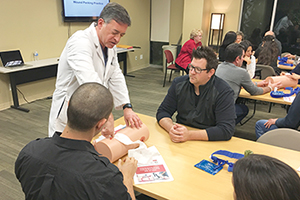By TIM O'NEIL
The mass shooting in Las Vegas last fall stunned the world. All told, 58 people were killed and about 500 injured when a single shooter unleashed his rapid-fire rifle volleys upon a crowded outdoor music concert from his 32nd floor suite at the Mandalay Bay Resort and Casino.

Dr. Sean Dort, standing, a trauma surgeon at Dignity Health-St. Rose Dominican Hospital in Nevada, explains to Shane Zeller, center, and others how to pack a deep wound during one of the hospital's "Stop the Bleed" training sessions for the public.
Dignity Health — St. Rose Dominican hospitals in Henderson, Nev., a near suburb of Las Vegas, were among the hospitals that treated victims on the night of Oct. 1.
Two months later, Dignity Health — St. Rose Dominican Siena Campus began offering public classes in "Stop the Bleed," a national effort to teach laypeople how to control severe bleeding until emergency personnel can arrive and take over. Designed primarily for bystanders to help victims of serious accidents or shootings, its skill set has been a powerful draw to residents of the Las Vegas area.
Among the approximately 260 people who already have attended the hospital's training sessions is Shane Zeller, 34, a lawyer in Henderson. He didn't know any of the victims of the mass shooting, but Zeller said he was struck while watching news reports that so many people at the scene appeared helpless.
"I guess all of us wonder how we could have helped those who were injured," said Zeller. "I'm not talking about being the hero. I'm asking, once the bullets stopped flying, could we have helped save people? If normal people can learn these skills, we can be a better community."
Zeller said the Stop the Bleed skills are relatively simple to learn. "This isn't triage," he said. "We learned how to stop or slow bleeding until a first responder can take over."
The U.S. Department of Homeland Security introduced Stop the Bleed in 2015 and has joined with hospitals and local governments to spread the knowledge. Trainees are encouraged to buy kits of tourniquets and wound-packing gauze that can be kept in homes or cars.
Kim Dokken, a registered nurse at Dignity Health — St. Rose Dominican, said the Siena campus is coordinating the training with the city of Henderson and the University Medical Center in Las Vegas. Dokken is senior director of the neuroscience service line, trauma and stroke at Dignity Health — St. Rose Dominican.
The hospital's three campuses — one in Las Vegas and two in Henderson just south of Las Vegas — treated 87 patients after the massacre. Of those, 36 had suffered gunshot wounds. Five were treated for critical wounds. An additional 10 victims were treated at one its neighborhood urgent-care centers. The system's last patient was discharged in November.
Dokken said the massacre has increased public interest in the program.
"Everyone thinks this kind of thing can't happen, but it happened to us," said Dokken. "I am amazed by the people who will leave their homes after long work days to take the class. They want to know what to do when they are suddenly called upon to help."
She said the one-hour course covers three skills — using a tourniquet, applying pressure to a wound and packing a wound with special gauze that speeds coagulation. The instructors work with small groups of students and use soft plastic aids resembling body parts to teach the techniques. Instructors include trauma surgeons, nurses and paramedics.
Dokken said a hospital can establish a similar program with only about $1,000 in equipment. The primary investment, she said, is in dedicating the time of participating staff.
The hospital helped teach Henderson city employees before opening the program to the public in December. Henderson Fire Chief Shawn White said he welcomes having more laypeople able to help victims before paramedics can arrive at scenes.
"For us to have the biggest impact to save more lives, we need to lock arms with the community so that more people are trained and have knowledge to render lifesaving skills in emergency situations," White said.
Zeller, the lawyer who took the course, said the skills are useful for any serious emergency. "This isn't just for shootings," he said. "You could have an accident or have someone suffer a deep cut at home. It could happen anytime, anywhere. I want to know what to do."
Copyright © 2018 by the Catholic Health Association
of the United States
For reprint permission, contact Betty Crosby or call (314) 253-3490.